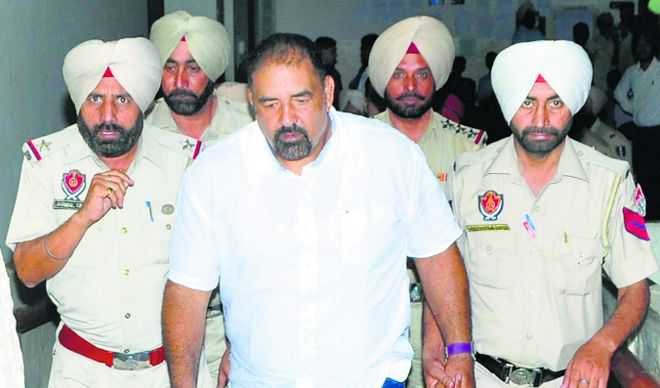
Pharmaceutical Hub: In the Jagdish Bhola case, Himachal Pradesh’s Baddi has emerged as the epicentre of addictive drugs.
Vikash Narain Rai
Former Director, National Police Academy, Hyderabad
THE conviction of dismissed DSP Jagdish Singh Bhola has affirmed the complicity of cops in drug trafficking in Punjab. However, it’s the onslaught of the illegal drug trade that poses a greater threat to society than the role of conniving policemen. The politician and the policeman are visible segments of the lucrative business, and accountable too. However, the challenge is to curb the demand for drugs. It can be done in two ways: first, provide treatment to people using drugs; second, decriminalise the possession of a small quantity of drugs, as Portugal has done, treating it as a public health issue and not a criminal one.
The drug trade is perceived as a menace not just for the users, but also for the community as a whole, because of two factors: it is a visible crime, capable of leaving a long-term crippling impact on the psyche of society; its operatives cannot keep themselves away from the lure of violence for long, thus upsetting society’s calm and eating into its law and order resources. Drug trafficking is a fast-paying ‘macho’ crime (the global illegal drug trade may be estimated at nearly 1 per cent of the total global trade). A combination of these factors led to the Bhola drug racket. The worldwide experience, however, is that “little policing sometimes produces safe (drug-free) communities, while heavy policing sometimes fails to do so.” Success in confronting drug trafficking depends more on the community’s self-defence than on robust policing.
The police-drug department-politician nexus decisively weakens the resolve of the community in its fight against drugs. According to a study conducted by the All India Institute of Medical Sciences (AIIMS-Delhi) in 2015, there were more than 2 lakh addicts in Punjab. The mushrooming of ill-equipped de-addiction centres across the state, practising forced withdrawal, mirror the escapist and defeatist nature of the resultant response. In the Bhola case, Himachal Pradesh’s Baddi, a ‘tax haven’ pharmaceutical hub near Chandigarh, has emerged as the epicentre of addictive drugs. Bhola was a key figure in the drug cartel, which was diverting chemicals meant for medicinal purposes to illegal factories in Baddi to manufacture synthetic drugs for consumption in the international market. In 2013, the Punjab Police busted the racket and recovered synthetic drugs in bulk, including heroin, methamphetamine, ephedrine and pseudoephedrine, besides cash, arms and luxury cars from the accused persons, including NRIs and their business and political associates.
Bhola will still be called small fry when we consider the volume and value of the drug trade in India. Even what Baddi actually offers and signifies is much bigger. Take the example of phensedyl, an addictive cough syrup. It is manufactured and bottled in Baddi, and its consignments, worth crores annually, are consumed in Bangladesh as a cheap substitute for banned liquor. On paper, the supplies of phensedyl are booked for destinations within the country and shown consumed in domestic markets. But the supply trucks are able to carry the loads to West Bengal, Assam and Tripura borders of Bangladesh. Apart from stealthily availing the smuggling options, several drug outlets in the border towns of these states are used to camouflage the arrival of phensedyl in huge quantities. This is done by showing mind-boggling consumption of this cough syrup by the sparse local population. According to a survey, over 20 lakh people of Bangladesh are addicted to this drug in their border towns. After years of diplomatic persuasion by Bangladesh, the Indian government banned the drug in March 2016, but within a couple of weeks, the Delhi High Court granted an interim injunction to the drug makers. How many government departments and what level of patronage on both sides of the border is involved, and how much money must be changing hands, is anybody’s guess.
Like Indian jails, US prisons are full of drug users. Colorado state, like Punjab, is grappling with an opioid crisis. A report says, “In Colorado’s prisons, about three-quarters of inmates are addicted to drugs or alcohol when they begin incarceration... The county jails were not set up to treat people with addictions and so they are often put through forced withdrawal, which not only increases medical risks, but is also one of the least effective ways to ensure someone stays clean and sober.”
Today, most medical experts in the US view addiction more as a disease than a choice. Back in the 1980s and 1990s, America witnessed a phase of drug hysteria and skyrocketing rates of incarceration. The policy was given a global push in the wake of the Iran-Iraq war and the Soviet-Afghan war, presumably to control the drug flow towards the West. The then Rajiv Gandhi government, fearing the increasing role of drug money in Sikh and Kashmir militancy, was persuaded to join the bandwagon. In 1985, the 1878 Opium Act was replaced by the draconian NDPS Act, ostensibly to cover psychotropic substances as well, prescribing a minimum punishment of 10 years for possessing commercial quantity (250 gm or more), in addition to huge fines, without distinguishing between soft and hard drugs. Even though it was argued that the soft drugs were gateway drugs, it only served, as anticipated, as a catalyst for operators to shift to hard drugs, which fetched more profit.
The stringent application of prohibition laws has always failed society. Total prohibition is too lucrative a business, as Bansi Lal’s Haryana learnt and Nitish Kumar’s Bihar will be learning in due course. ‘Dry Gujarat’ today allegedly generates a huge turnover in banned liquor. Yogi Adityanath’s Uttar Pradesh, famous for ‘macho policing’, witnessed a major hooch tragedy recently. The enforcement of the NDPS Act over the past three and a half decades has generated several hundred times more money and compromised many times more policemen than for all drug trafficking activities put together in India.
In contrast, in Portugal, since decriminalisation in 2001, getting caught with a ‘personal’ drug attracts a small fine and maybe a referral to a treatment programme — not jail time and a criminal record. Among Portuguese adults, there are three drug overdose deaths for every 10 lakh citizens. The corresponding numbers in other European countries range from 10.2 in the Netherlands and 44.6 in the UK to 126.8 in Estonia. Punjab, where the present government has proposed death penalty for drug peddlers, is said to be witnessing hundreds of deaths annually due to drug overdose and the withdrawal syndrome. The irony of a police scandal of the magnitude of the Bhola episode, amid the cries for an all-out war on drugs, cannot be missed by the people of Punjab.



























